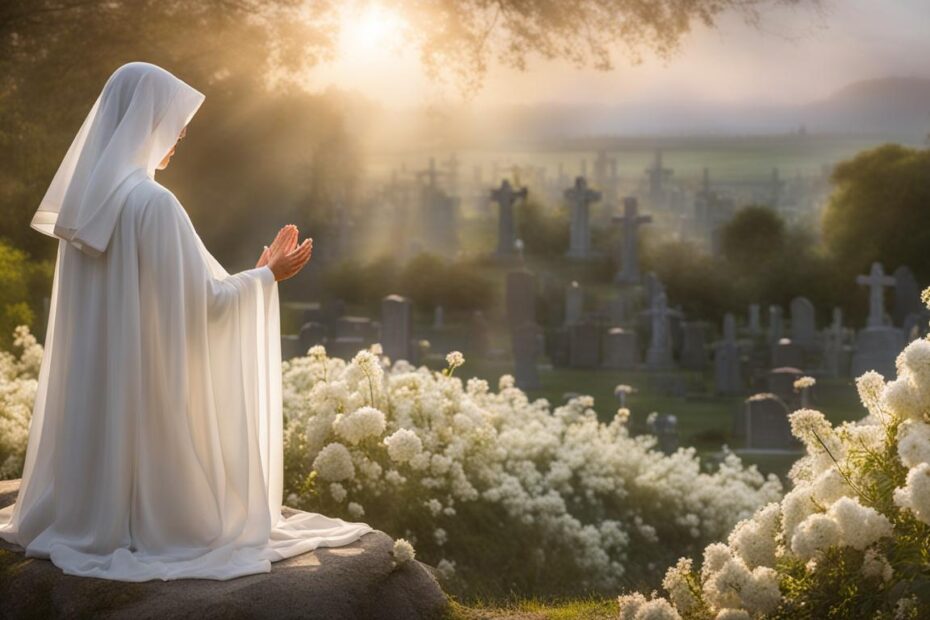In many cultures and religions, the mourning process continues for 40 days after the funeral. It is believed that the soul of the deceased wanders the Earth during this time, visiting significant places from their life and their grave. At the end of the 40-day period, the soul departs from this world. Many families choose to host another celebration on the 40th-day mark to commemorate the deceased. This article explores the spiritual significance and traditions surrounding prayer on 40 days after death.
Key Takeaways:
- Prayer on the 40th day after death is an important tradition in many cultures and religions.
- The 40-day period is believed to be a time when the soul of the deceased wanders the Earth before departing from this world.
- Many families choose to host a commemoration or celebration on the 40th-day mark to honor and remember their loved ones.
- Praying for the deceased during this period is believed to provide support and assist their souls in their journey through the afterlife.
- Understanding the cultural and religious beliefs surrounding prayer on 40 days after death can provide comfort and guidance to those mourning the loss of a loved one.
History of 40 Days After Death
Different religions and cultures have varying beliefs and rituals surrounding the 40 days after death. In Judaism, the number 40 is considered significant and symbolizes completion and fullness. In Islam, Prophet Muhammad was 40 years old when he received his first divine revelation. Christianity also mentions the number 40 multiple times in the Bible, symbolizing a completed period of trial and testing. Understanding the historical significance of the 40-day period provides insights into the traditions and practices observed by different faiths.
The concept of a 40-day period of mourning and remembrance can be traced back to ancient times. In ancient Egyptian culture, the deceased were believed to undergo a 40-day journey through the afterlife before reaching their final resting place. This belief influenced later religious traditions that incorporated a similar period of mourning and prayer. The 40 days after death are seen as a time for the soul to complete its earthly journey and prepare for the next stage of existence.
Throughout history, various religious and cultural practices have developed around the 40-day period. These practices often involve prayer, remembrance, and acts of charity in honor of the deceased. The specific rituals and traditions vary greatly depending on the religion and cultural background of the individual. However, the underlying belief in the spiritual significance and transformative nature of the 40-day period remains a common thread across different traditions.
| Religion | Beliefs and Practices |
|---|---|
| Judaism | The number 40 represents completion and fullness. Mourning period of 40 days. |
| Islam | Prophet Muhammad received his first divine revelation at the age of 40. Belief in the importance of the 40th-day commemoration. |
| Christianity | Symbolism of a completed period of trial and testing. Mention of the number 40 in the Bible. |
When to Start Counting the 40 Days After Death
The start of the 40-day mourning period varies across cultures and traditions. Generally, it is believed that the count begins on the day following the death, with the first full day after the passing being considered “Day 1” of the 40-day period. However, cultural nuances and personal beliefs may influence the approach, with some considering the day of death itself as “Day 1”. It is important to respect individual preferences and cultural practices when determining the starting point of the 40-day period.
In some cultures, the counting of the 40 days after death begins from the day of the funeral or burial. This practice is often observed when the family considers the funeral day as a significant milestone in the journey of the soul. Other cultures may start counting from the day after burial or cremation, believing that the soul remains in close proximity to the body until the final rites are completed.
Understanding the various approaches to counting the 40 days after death showcases the diversity of mourning rituals and cultural nuances. It highlights the importance of respecting and honoring different traditions, as each holds its own significance for the grieving families.
Modern Traditions and Practices in Each Religion
When it comes to modern traditions after death, different religions have their own unique practices and rituals. These traditions provide comfort and support to grieving families and help honor the memory of the departed loved ones.
Roman Catholicism
In Roman Catholicism, the belief in the 40th-day tradition varies, but it is still observed in Filipino Catholicism, influenced by Spanish colonization. On the 40th day, a memorial gathering known as “Paalam” is held as a way to commemorate the deceased. It involves a prayer service, where family and friends come together to offer prayers for the soul of the departed. This gathering often includes food and refreshments, providing an opportunity for loved ones to share stories and memories.
Russian Orthodoxy
Russian Orthodox traditions include strict beliefs regarding memorial prayers on specific days after death. On the 1st, 3rd, 9th, and 40th days, memorial prayers are offered for the departed soul. In addition, memorial services are held on every anniversary of the death. These services involve prayers, hymns, and the lighting of candles to honor and remember the deceased.
Greek Orthodoxy
Greek Orthodox traditions involve a 40-day mourning period, during which the family avoids social gatherings and maintains the gravesite. Prayers for the deceased are offered throughout this period, with a special focus on the 3rd, 9th, and 40th days. On these days, family and friends gather at the gravesite or in the church to offer prayers and remember the departed soul.
These are just a few examples of the modern traditions and practices observed in different religions. It is important to note that traditions may vary within each religion based on cultural beliefs and regional customs. Understanding and respecting these practices can help provide support and comfort to those who are grieving.
| Religion | Modern Traditions |
|---|---|
| Roman Catholicism | Memorial gathering on the 40th day |
| Russian Orthodoxy | Memorial prayers on the 1st, 3rd, 9th, and 40th days |
| Greek Orthodoxy | 40-day mourning period and prayers on the 3rd, 9th, and 40th days |
Importance of Praying for the Dead
Praying for the dead holds great significance in various religions, offering a means of spiritual connection, comfort, and support for both the deceased and the living. The act of prayer is believed to have transformative power, providing a pathway for the soul to find solace and guidance in the afterlife.
In Catholicism, prayers for the dead aim to assist the souls in purgatory, a state of cleansing and purification. The faithful offer prayers and sacrifices, including the Holy Mass, to help the departed souls attain spiritual cleansing and receive God’s mercy.
“Eternal rest grant unto them, O Lord, and let perpetual light shine upon them.”
In Orthodox traditions, prayers on the 3rd, 9th, and 40th days after death are considered crucial in aiding the soul’s journey through the afterlife. These prayers offer spiritual support and alleviate the departed’s suffering, allowing them to progress towards heavenly realms.
Praying for the dead also holds deep symbolic significance, reflecting a desire for divine revelation and guidance. It demonstrates the living’s commitment to honoring the memory of their departed loved ones and seeking a connection beyond the physical realm.
Table: Traditions Surrounding Praying for the Dead
| Religion | Beliefs and Practices |
|---|---|
| Catholicism | Prayers and sacrifices are offered to assist the souls in purgatory. The Holy Mass is considered the most powerful prayer for the dead. |
| Orthodox Christianity | Mourning prayers on the 3rd, 9th, and 40th days after death provide spiritual support for the departed, helping them in their journey through the afterlife. |
| Islam | Prayers for the deceased are offered to seek forgiveness and mercy from Allah, ensuring a peaceful transition to the afterlife. |
| Judaism | Mourners recite the Kaddish, a prayer praising God, to honor the deceased and provide comfort to the mourners. |
“When we pray, we speak to God; but when we read, God speaks to us.” – St. Jerome
Throughout diverse religious traditions, praying for the dead serves as a spiritual act of compassion, love, and remembrance. It offers an opportunity to honor the departed, seek forgiveness, and strengthen the bond between the living and the souls of the deceased.
Celebrating the 9th and 40th Day After Death
The commemoration of the 9th and 40th days after death is a time-honored tradition in many cultures and religions. These milestones hold deep significance in the journey of the soul, as it navigates the afterlife and awaits judgment. The rituals and practices observed during these commemorations aim to provide comfort and support to the departed, as well as to honor their memory.
On the 9th day after death, family and friends gather to perform prayers and rituals, seeking forgiveness for any sins committed by the departed. This day is seen as an opportunity for the soul to cleanse itself and find solace in the afterlife. It is a time of remembrance, reflection, and seeking divine mercy. The memorial services held on the 9th day often involve reciting prayers, offering incense, and making offerings to honor the departed.
The 40th day after death is another important milestone in the journey of the soul. It is believed that by this time, the soul has completed its journey through heavenly and hellish abodes and is ready to depart from this world. Similar to the 9th day, the 40th day is marked by special prayers, rituals, and memorial services. The intention is to provide further support and guidance to the soul as it transitions to its final destination.
Throughout these commemorations, family and friends come together to remember their loved ones, share stories, and offer prayers. These traditions serve as a way to keep the memory of the departed alive and provide comfort to those left behind. By honoring the 9th and 40th day after death, individuals find solace in their grief and find strength in their spiritual beliefs.

Rituals and Practices in Different Cultures and Religions
| Culture/Religion | 9th Day after Death | 40th Day after Death |
|---|---|---|
| Roman Catholicism | A memorial mass is often held on the 9th day to commemorate the deceased. | While not universally observed, some Filipino Catholics hold a special mass and gathering on the 40th day as a remembrance of the departed. |
| Russian Orthodoxy | Prayers and memorial services are held on the 9th, 20th, and 40th days after death, along with annual memorial services thereafter. | The 40th day is considered significant, and families often hold a memorial service and gather at the gravesite to honor the departed. |
| Greek Orthodoxy | The 9th, 20th, and 40th days after death are marked by prayers and memorial services. | The 40-day mourning period concludes on the 40th day with a special memorial service. |
These are just a few examples of the traditions and practices observed in different cultures and religions. While the specific rituals may vary, the underlying intention remains the same – to honor and remember the deceased and to provide support to their souls as they journey through the afterlife.
Conclusion
Prayer on the 40th day after death holds deep spiritual significance and plays an important role in the grief journey. It provides an opportunity to honor and remember loved ones, to seek forgiveness for their sins, and to offer support as their souls transition to the afterlife.
Understanding the cultural and religious beliefs surrounding prayer on the 40th day after death brings solace and guidance to individuals navigating the mourning process. It serves as a means of remembrance and allows for the expression of love and respect for the departed. Through prayer, we can find comfort and strength as we navigate the complex emotions associated with grief.
As we engage in prayer on the 40th day after death, we are reminded of the interconnectedness of life and death, the spiritual journey of the deceased, and the transcendent power of remembrance. It is a time to reflect on the impact our loved ones have had on our lives and to honor their memory as we carry on their legacy.
In the midst of grief, prayer on the 40th day after death provides a source of solace and hope. It allows us to connect with the divine, find peace in the midst of sorrow, and seek comfort in the remembrance of our loved ones. Embracing this spiritual practice can guide us through the healing process and help us find meaning in the midst of loss.
FAQ
What is the significance of praying on the 40th day after death?
Praying on the 40th day after death is believed to help the soul find its place in the afterlife and provide support during its journey.
When does the 40-day mourning period start?
The start of the 40-day mourning period varies, but it is generally believed to begin on the day following the death.
What are the modern traditions and practices for the 40 days after death in different religions?
Different religions have their own traditions. For example, Roman Catholicism observes the 40th-day tradition in Filipino Catholicism, while Russian-Orthodox traditions include memorial prayers on the 1st, 3rd, 9th, and 40th days after death.
Why is praying for the dead important?
Praying for the dead is considered important as it is believed to assist the soul in its journey through the afterlife and offer support in purgatory or other realms.
What happens on the 9th and 40th days after death?
On the 9th day, prayers and rituals are performed to honor the deceased and seek forgiveness for their sins. On the 40th day, a second commemoration takes place to assist the soul in finding its place in the afterlife.
What is the purpose of prayer on the 40th day after death?
The purpose of prayer on the 40th day after death is to honor and remember loved ones, offer support to their souls, and seek forgiveness on their behalf.








